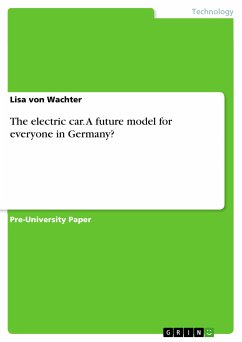Pre-University Paper from the year 2018 in the subject Electrotechnology, grade: 1,3, , language: English, abstract: One million electric vehicles by 2020 was the federal government's goal. So far, only 53,861 purely electric cars are driving in Germany (as of January 1st, 2018). However, manufacturers are having to rely more and more on electrical engineering in order not to exceed the upper limit of the permitted CO2 emissions for cars. This upper limit is further reduced by politicians in order to reduce CO2 emissions in traffic. Cars with internal combustion engines will not be able to meet these future values. The importance of electric cars in the future is therefore a topic that is being discussed more and more frequently in the media, in politics and in business. In order to advance the energy transition, Lienkamp calls for an urgent rethinking of car use. With the statement "Because I go on vacation once a year, I don't have an Airbus in the garden" he tries to convince his listeners that an electric car does not have to drive 1000 km at a time if it is primarily used for the city. The key question in my seminar paper is whether the electric car, with its advantages and disadvantages, will be a future model for everyone in Germany. At the beginning I would like to give an overview of the topic of electric cars and describe the current situation in Germany. Among other things, I check the sustainability of the electric cars. Are they really as ecological as the proponents always say? Then I deal with the important topic of range, which is often described as insufficient. I will also explain the situation of the charging infrastructure today and in the future. Is the charging infrastructure already sufficient, and what needs to change in the future? The question of cost plays a relevant role and is an important decision point for many buyers. When will electric cars cost as much or even less than cars with internal combustion engines? Who will switch to an electric car and when in the future? I will deal with these questions and others in the topic of future viability of the electric car. The content of my investigation is limited to electromobility in the passenger car sector. In addition, I will only go into the development, the sensible use of pure electric cars and their future prospects in Germany and leave out global change. Hydrogen vehicles and hybrid vehicles are not taken into account.
Dieser Download kann aus rechtlichen Gründen nur mit Rechnungsadresse in A, B, BG, CY, CZ, D, DK, EW, E, FIN, F, GR, HR, H, IRL, I, LT, L, LR, M, NL, PL, P, R, S, SLO, SK ausgeliefert werden.









